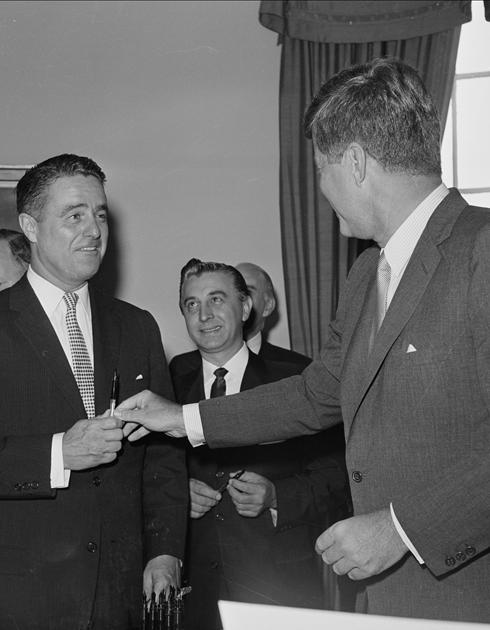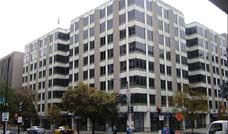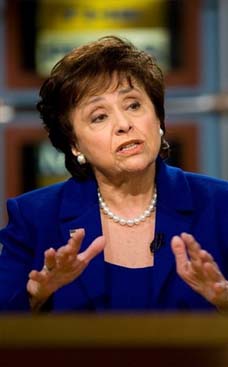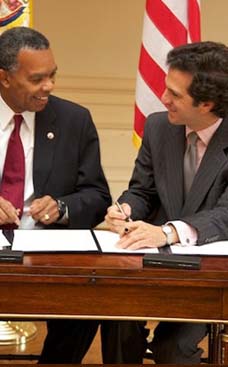
When Pan American World Airways dropped us off in Accra, the smells, sounds and sights were overwhelming. The country's Peace Corps director met us and put us up temporarily in the Peace Corps Hostel. It was a bunk bed with nets. He gave us a code word: "desist". If we received any message with that word, we were told to immediately return to Accra and prepare for evacuation. This set the stage for me to arrive, as the only American, at a boarding school called Prempeh College in Kumasi. I was joined by two similar volunteers, Ivan and Alex, from the Soviet Union. I was placed in a small house on the compound, called a Chattanooga for some reason. It consisted of two pink boxes, with the larger box on top of the smaller one. Peace Corps rules prohibited us from driving but permitted us to have bicycles. Only two brands were available, one from China and one from Hungary. We were not allowed to purchase the Chinese bike, which was my introduction to cold war policies. A bike from behind the "Iron Curtain" was OK while one from "Red" China was not. For two years I taught math. I tried to dispel the image of "The Ugly American" by sponsoring singing groups and extra-curricular activities. I helped to write a series of modern math textbooks that ended up being adopted in Ghana, Jamaica and Uganda, conducted student community service projects in nearby villages and took students on cultural exchanges to nearby countries, including Nigeria.
John David writes: I was in one of the first Peace Corps groups to go to Ghana in West Africa
John David: First-generation Peace Corps member recalls defining experience, lifelong friends
Fifty years is a golden time for reflection. It is a time for celebrating special anniversaries and birthdays, as in the 50th anniversary of the founding of the Peace Corps.
By John David
Fifty years is a golden time for reflection. It is a time for celebrating special anniversaries and birthdays, as in the 50th anniversary of the founding of the Peace Corps.
With 60 others, I graduated from a small rural high school in northern Michigan. Few roads into town were paved. In school, I assumed the role of community organizer. With friends, we took over the defunct Chamber of Commerce and tried to put the town on the map. I landed at the University of Michigan in Ann Arbor, and became totally lost in a vast new world. Nearby, Tom Hayden was organizing the Students for a Democratic Society and trouble was brewing in Detroit, a place I knew only as "Down Below" because the dads of many high school classmates all seemed to work there during the week.
John F. Kennedy came to the Michigan Union, which was the Student Center, and called upon us to join a new movement called the Peace Corps. I vowed to join and a few years later, armed with a teaching certification in mathematics, I was in one of the first Peace Corps groups to go to Ghana in West Africa.
There were six of us -- and all of us had been through two summers of rigorous pre-country training. I had been sent to Dartmouth College in New Hampshire and Morehouse College in Atlanta, learning amazing things about the cold war, political systems, economics and Africa. In Atlanta, I met with Martin Luther King Jr., who was also planning to go to Ghana, a trip that never occurred.
Ghana's President was Kwame Nkrumah. Nkrumah was educated in the United States but was deeply opposed to American foreign policy and corporate exploitation in developing nations. He wrote several books, including "Neocolonialism: The Last Stage of Imperialism". At his side was W.E.B. Dubois, who was working on Pan-African unity, and Shirley Dubois, who headed Ghanaian television. Nkrumah headed world leaders, who, at that time, included Gamal Abdel Nasser of Egypt, Julius Nyerere of Tanzania, Patrice Lumumba of the Republic of Congo and Jawaharlal Nehru of India. At the time, Ghana hosted training camps for revolutionary forces. The situation was more than tense.
Kennedy offered Nkrumah assistance to build the Akosombo (Volta) Dam, an immense project that would, in part, power the giant aluminum smelter that Kaiser Aluminum would build in Tema, a port city near Accra. The smelter, a sister facility to Kaiser's plant at Ravenswood, led to some of the Peace Corps volunteers being geologists who explored for bauxite deposits. The rest of us, Nkrumah said, had to be certified math or science teachers. He told the same to the Soviet Union, which also provided volunteers. He wanted no "do-gooders" or "agents" from the Super Powers to indoctrinate students. He also told the United States "no thanks" to the Peace Corps stipend. Instead, he provided us a living allowance based on the lowest paid Ghanaian teacher.
When Pan American World Airways dropped us off in Accra, the smells, sounds and sights were overwhelming. The country's Peace Corps director met us and put us up temporarily in the Peace Corps Hostel. It was a bunk bed with nets. He gave us a code word: "desist". If we received any message with that word, we were told to immediately return to Accra and prepare for evacuation.
This set the stage for me to arrive, as the only American, at a boarding school called Prempeh College in Kumasi. I was joined by two similar volunteers, Ivan and Alex, from the Soviet Union. I was placed in a small house on the compound, called a Chattanooga for some reason. It consisted of two pink boxes, with the larger box on top of the smaller one. Peace Corps rules prohibited us from driving but permitted us to have bicycles. Only two brands were available, one from China and one from Hungary. We were not allowed to purchase the Chinese bike, which was my introduction to cold war policies. A bike from behind the "Iron Curtain" was OK while one from "Red" China was not.
For two years I taught math. I tried to dispel the image of "The Ugly American" by sponsoring singing groups and extra-curricular activities. I helped to write a series of modern math textbooks that ended up being adopted in Ghana, Jamaica and Uganda, conducted student community service projects in nearby villages and took students on cultural exchanges to nearby countries, including Nigeria.
Communications were limited to blue lightweight air letters and small reel-to-reel tapes. There were no computers, no internet. In fact, there was often no electricity. Several months after arrival and early one morning, one of my students breathlessly rushed to my Chattanooga to say the troops from the next door army base were "moving".
The next thing I knew was that Nkrumah, who was in Hanoi on an effort to resolve the Vietnam War, was deposed. He ended up in Guinea with Stokely Carmichael of SNCC (Student Nonviolent Coordinating Committee) fame, thereby breaking up the Pan-African effort to form a Ghana-Guinea-Mali political union. A few days later, the Army truck came to the school. Ivan, Alex, and I sat on the stoops of our houses. We all knew somebody would be picked up. Ivan and Alex were ordered into the truck. My code word never came. And that was the day I decided that I needed to know much more about who was doing what to whom and why.
Somehow I heard that there was a new Ph.D. program in economics at West Virginia University. Arriving in Accra at 4 a.m. after a muddy eight-hour trip, I took the Graduate Record Exam four hours later. WVU accepted me and assigned me to William H. Miernyk, a Benedum Professor who headed up WVU's Regional Research Institute. WVU had a major interest in East Africa and perhaps thought I could help out. Needless to say, I was not impressed with my first research assignment, which was to assist two professors studying the economic use of cow dung among the Masai. Fortunately, assignments improved, and soon I became involved with labor issues and projects related to the recently formed Appalachian Regional Commission.
After WVU, I landed at WVU Tech. Leonard Nelson was President and Jack Robertson was the dean. They were actively involved with War on Poverty projects, including affordable housing, Appalachian Research and Defense legal aid, Black Lung counseling, and similar projects. I fit this mold, and a year later became chairman of the newly created Department of Social Sciences and Public Administration.
My Ghanaian connections came along. One of my Ghanaian colleagues obtained his Ph.D. in economics at Indiana University and I asked him to join me at Tech. After Tech, he became head of the Ghanaian Bank for Housing and Reconstruction. The student who alerted me about the troop movement also came to Tech, became an officer in the Student Government Association, and is now a government figure and businessman. He then sent his daughter to Tech, who recently graduated in Health Services Administration. The most recent former student who arrived at Tech is Solomon Addico. Addico, who currently is the chief financial officer at WVU Tech, was in my first math class in Ghana.
Four of the six of us who arrived in Ghana are still close friends. John became a biochemist and researcher at the University of Iowa; Bob became a chemist with Schering-Plough Pharmaceutical; and Paula went to teach math on the Pine Ridge Reservation and then became a health professional near Boston.
As you can imagine, there is more to the story. But this is enough to say "Thanks" to John F. Kennedy and "Congratulations" to the Peace Corps. The Peace Corps made a major difference in my life and the lives of many. I am forever grateful that the Peace Corps experience was not the end, but became only the beginning of my journey to West Virginia.
David, a Gazette contributing columnist, is a professor at WVU Tech.













